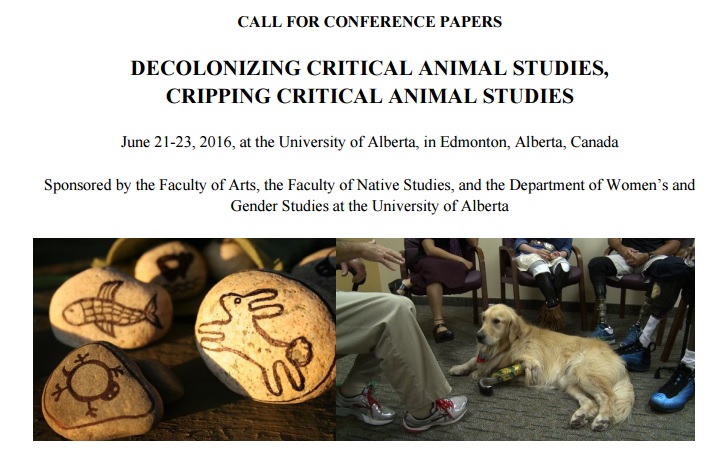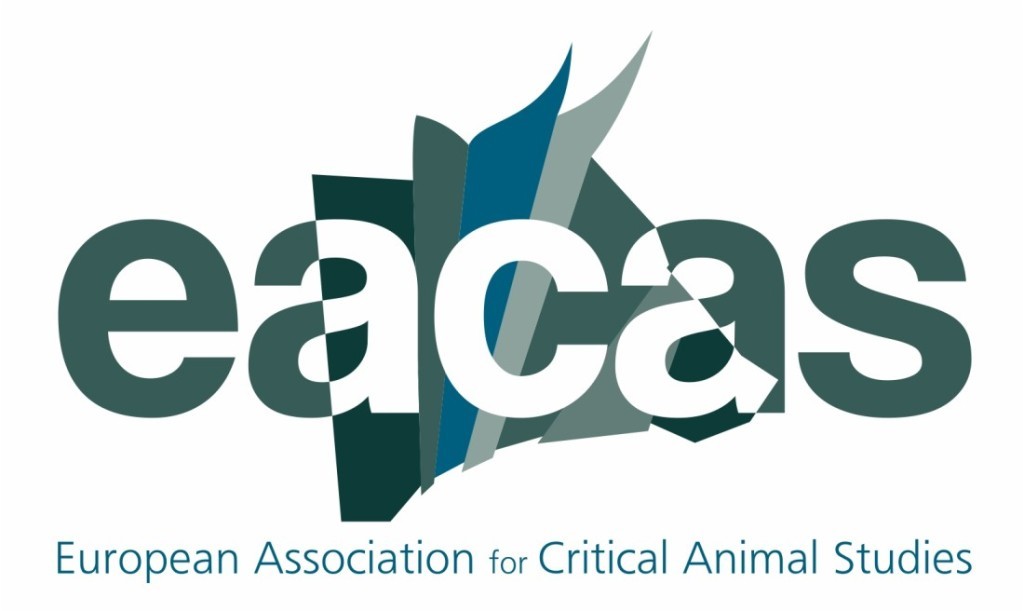Conference plenary panels will include: Decolonizing Critical Animal Studies, moderated by Billy-Ray Belcourt (University of Alberta) and featuring
• Kim TallBear (Associate Professor of Native Studies, University of Alberta),
• Maneesha Decka (Associate Professor of Law, University of Victoria), and
• Dinesh Wadiwel (Lecturer in Human Rights and Socio-legal Studies, University of Sydney).
Cripping Critical Animal Studies, moderated by Vittoria Lion (University of Toronto) and featuring
• Sunaura Taylor (artist and author),
• Stephanie Jenkins (Assistant Professor of Philosophy, Oregon State University), and
• A. Marie Houser (independent writer, editor, and activist).
Taxonomies of Power, Plenary by Claire Jean Kim (UC Irvine)
The first thread of conversation that we hope to develop is that of decolonizing Critical Animal Studies. While some theorists have turned to non-Western and indigenous cultures for examples of less or nonspeciesist worldviews, the relationship between anti-colonial politics and animal activism has been fraught. Single-issue animal activist campaigns have often functioned to justify racism, xenophobia and exclusion, with, to adapt Gayatri Spivak’s phrase, white humans saving animals from brown humans. The eating of shark fins and dog meat has been marked as cruel and backward, for instance, in contrast with dominant constructions of Western diets as sophisticated and humane. Indigenous rights activists and animal activists have clashed over the issue of hunting charismatic animals, such as whales and seals, often eclipsing attention to far more widespread forms of animal, colonial, and racial oppression in Western, settler societies. Ecofeminist approaches to animal ethics have been riven over the issue of indigenous hunting; some ecofeminists, such as Marti Kheel, have expressed dismissive views of the spiritual significance of subsistence hunting for indigenous people, while others, such as Val Plumwood, Deanne Curtin, and Karen Warren, have argued for contextual rather than universalizing forms of ethical vegetarianism. More recently, decolonial scholars have shown the interconnections between animal oppression, imperialism, and settler colonialism, and the need to center race in Critical Animal Studies. Maneesha Decka, for instance, has highlighted the ways that imperialism is justified through animalizations of racial others and condemnations of the ways colonized others treat animals, even while imperial identities are constituted through the consumption of animal bodies. Billy-Ray Belcourt has argued that speciesism and animal oppression are made possible in settler colonial contexts through the prior and ongoing dispossession and erasure of indigenous people from the lands on which animals are now domesticated and exploited. Belcourt critiques the ways that Critical Animal Studies assumes and operates within the ‘givenness’ of a settler colonial state, and suggests that Critical Animal Studies should center an analysis of indigeneity and call for the repatriation of indigenous lands. Possible presentation topics for the Decolonizing Critical Animal Studies thread include:
• The intersections of decolonial and Critical Animal Studies
• The uses of nonhuman animals in projects of land settlement
• Cultural food colonialism or decolonial food studies
• Reservization, food and fat studies
• Animal ethics and decolonization
• Animals, ontology, and settler colonialism
The second thread of conversation that we wish to pursue at this meeting is the cripping of Critical Animal Studies. Scholars working at the intersections of Critical Animal Studies and Critical Disability Studies have argued that the oppression of nonhuman animals and disabled humans are interconnected. Humans who defend animals and refrain from eating them have often found themselves labeled as cognitively disabled, mentally ill, ‘stupid’ or ‘crazy,’ and psychiatrists have proposed diagnoses for animal activists and vegans such as ‘anti-vivisection syndrome’ and ‘orthorexia nervosa.’ Disabled humans, like people of colour, have been put on display along with nonhuman animals in the history of ‘freak’ shows, and disabled humans and nonhuman animals continue to have their bodies objectified and their interests sacrificed for the purposes of medical training and scientific knowledge. Disabled humans are continually compared to nonhuman animals, not only in insults but also in medical terminology, with effects that are oppressive because of the pre-existing denigration of nonhuman animals. The same claims about what makes human life ontologically distinct and morally valuable—that humans have reason, that humans have language, that humans are autonomous—justify the exclusion of both nonhuman animals and cognitively disabled humans from moral consideration, as well as the oppression of physically disabled humans who are considered ‘dependent.’ Despite these interconnecting oppressions, speciesism has characterized Critical Disability Studies as much as ableism has characterized animal rights discourse (Peter Singer, Jeff McMahan). In recent years and more productively, however, Critical Animal Studies scholars such as Sue Donaldson, Will Kymlicka, Stephanie Jenkins and Sunaura Taylor have borrowed from Critical Disability Studies scholarship to argue that the dependency and vulnerability of domesticated animals should not be a reason to devalue their lives; far from removing a human or another animal from the realm of moral concern, (inter)dependency and vulnerability are the animal (and thus human) condition. Two types of animals come immediately to mind at the intersections of Critical Disability Studies and Critical Animal Studies: the service animal and the disabled animal, and scholars such as Kelly Oliver and A. Marie Houser have provided ethical analyses of these animals drawing on both animal and disability ethics. In particular, while disability scholars have critiqued the ways we view disabled humans as pitiful, tragic, exotic, or inspirational, Houser observes that heartwarming images of disabled pigs and dogs in mobility devices function to reassure viewers that we live in a society that is extraordinarily compassionate to animals, even while actual animals have by and large disappeared from view, sequestered in institutions of exploitation, containment and death. Possible presentation topics in the Cripping Critical Animal Studies thread include:
• Intersections of Critical Disability and Critical Animal Studies
• Critiques of the work of Temple Grandin
• The ethics of using service animals
• Representations of disabled animals
• The cultural associations between mental illness and love for animals (e.g. ‘crazy cat ladies’)
FORMAT: Presentations should be 20 minutes in length, leaving 10 minutes for discussion. We are receptive to different and innovative formats including but not limited to panels, performances, workshops, and public debates. You may propose individual or group presentations, but please specify the structure of your proposal. Please be sure to include your name(s), title(s), organizational affiliation(s), field of study or activism, and A/V needs in your submission.
DEADLINE FOR SUBMISSIONS: January 10, 2016
TO SUBMIT: email an abstract of no more than 500 words and a bio of no more than 150 words to the conference organizers: Chloë Taylor (chloe3[at]ualberta[dot]ca) and Kelly Struthers Montford (kelly.sm[at]ualberta[dot]ca)

